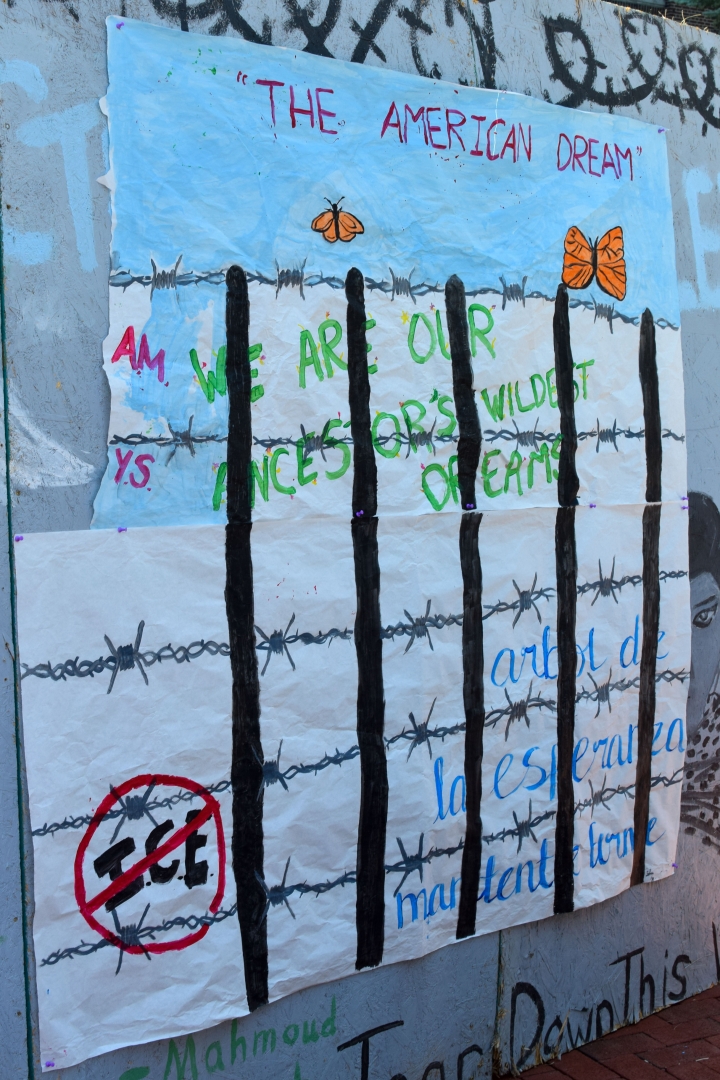
Members of the University of Michigan Students Allied for Freedom and Equality and La Casa gathered in the Diag on Tuesday afternoon for an annual demonstration, focused on the border wall between Israel and West Bank Palestinian territories, as well as the border wall between the United States and Mexico.
Two large painted mock walls stood in the Diag, and members of SAFE and La Casa gathered in front of them to chant, sing and listen to experiences of their classmates. One SAFE member, who requested to remain anonymous due to safety concerns, explained the parallels between the two walls, pointing to specific discrimination faced by students because of these borders.
“We’re putting them up to raise awareness about the unjust human rights violations that happen at both of these borders,” the SAFE member said. “The same things that are happening at the U.S.-Mexico border are also happening at the Palestinian-Israeli border. Families are subject to family separations, discrimination, harassment. They’re usually detained for hours and hours, even if you are an American citizen.”
The member explained how students of Palestinian or Arab heritage who go on study abroad trips through the University are often stopped at checkpoints, where they are forced to wait in long lines and are subject to intense interrogation, strip-searches and other forms of harassment.
The member also spoke about international political blacklists, highlighting the fears many Palestinian, Arab and Pro-Palestinian students have of being placed on a blacklist.
Central Student Government passed a #UMDivest resolution for the first time in the University’s history in 2017, which was also the first time the body allowed for a secret ballot, which members approved to protect pro-Palestinian students from blacklists.
“If you are put on that list and you go through these checkpoints, they’ll pull you out and you’re going to be interrogated, you’ll probably be deported, not allowed in,” the student said. “That’s something that the University has ignored time after time and has not released any statements about, and that’s another thing we’re trying to raise awareness about.”

LSA senior Yezenia Sandova, a member of La Casa, an organization that supported SAFE in its divestment resolution last year, said it was important to show solidarity with communities facing similar struggles.
Sandoval spoke about the parallels between the two border walls, especially considering the human rights violations committed as a result of the walls. She also highlighted the demonstration’s aim to raise awareness of struggles faced by minority students on campus and how the walls are affecting their lives at the University.
“Our main purpose, hopefully, by having this painting out here, was just to raise awareness and continue to have the U.S.-Mexico border conflict in the minds of people, especially when it comes to family separation, especially when it comes to Trump’s zero-tolerance policy, his termination of catch and release and just to show how inhumane these policies are and how even after so many months, there’s literally no comprehensive immigration reform,” Sandoval said. “There (are) people in Central America and all of these countries struggling and trying to come to the U.S. for more educational, economic opportunities, and who are facing violence, persecution in their communities, and that’s a lot of the parallels that’s happening in Israel, Palestinians are facing a lot of human rights violations and inhuman policies, especially in interactions when it comes to border patrol.”
The SAFE member agreed, highlighting their efforts through divestment and demonstrations like Tuesday’s, to hold the University accountable for its actions in human rights violations. The 2017 divest vote, which was later voted down by the Board of Regents, called for the University to divest from Boeing, Hewlett Packard and United Technologies for supplying weapons and equipment to the Israeli military. As recently as June, Israel has been condemned by the United Nations for using lethal force against Palestinian civilians protesting at the Gaza border.
“It’s important for us to get these walls out because we want to make sure that people are understanding the stake and how complicit we are as a University in these crimes. I know the border wall seems so far away… but our University is very complicit in these human rights violations because we are investing in American companies that are profiting off these border walls,” the student said. “We’re still pushing for the University to form a committee to investigate our investments in these companies that are complicit in the human rights violations at each of these borders.”

